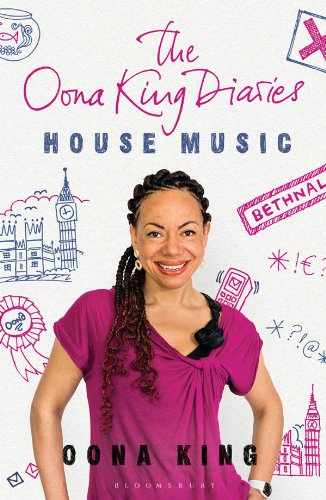As she welcomes a third baby, Oona King talks to Rosamund Urwin about motherhood, the struggles of adoption and why she’ll be voting for her old opponent in the mayoral election
Oona King’s local pub in Mile End could scarcely have more appropriate reading material on its loo doors: a list of memorable lines and gaffes from Boris and Ken. Among them is Johnson’s bizarre quip “Voting Tory will cause your wife to have bigger breasts”, and the quote that has come back to haunt Livingstone: “These rich b******s just don’t get it. No one should be allowed to vote in a British election, let alone sit in Parliament, unless they pay their full share of tax.”
Not that Baroness King of Bow - who last week joined Livingstone’s team as a champion for the young - actually sees these. A few minutes after I arrive at the pub to meet the woman Ken beat to the Labour mayoral nomination, I get a whispered phone call, complete with baby daughter Ariel bawling in the background. Since King is struggling to get the seven-month-old - whose adoption was only finalised a week ago - to sleep, would I come to another pub just down the road? The one King and her husband, Italian ad executive Tiberio Santomarco, have turned into their family home?
Their open-plan living area is packed with baby paraphernalia, although it’s ordered chaos, rather than a toy obstacle course. King immediately confesses she isn’t sure why she has agreed to do an interview, when her mind is more on nappies than the mayoral race.
Ariel is the third in the King-Santomarco brood, a sister for six-year-old Elia and four-year-old Kaia. The 44-year-old former MP for Bethnal Green and Bow is on maternity leave from her job as diversity executive at Channel 4, but is still busy at the House of Lords.
She denies being a superwoman, but how does she juggle it all? “People always ask me that question... I look a state because I get dressed in the dark — I am either putting the baby to sleep or she has just woken up ... that has caused wardrobe malfunctions aplenty.”
The couple adopted Elia and Kaia aged 13 months but Ariel six months younger thanks to two “extraordinary” social workers: “For me, she is a miracle child because I never imagined I would ever have a baby. I saw Ariel when she was four months old and I will never get over that until the day I die because it was never in the script. It had been drummed into us by every single social worker - ‘You’ll never get a young baby’ - but a miracle happened.”
Social workers made the couple rejig their house: they were troubled by a cactus in the corner and demanded Ariel have her own room: “Our house is open-plan but it doesn’t matter how big the house is, the children have to have separate rooms. But when you just want your baby, you want your baby. At the end of the day, they’re giving you a baby, not a Wii.”
The two elder children know they are adopted (“we don’t want there to be any dark secrets lurking in wardrobes”), as will Ariel when she grows up. King tells me proudly that Elia, a boy with a big smile and bigger hair, thinks it is “cool” to be adopted.
Making adoption easier is one of King’s great political campaigns. She believes that the process needs speeding up and that ethnicity-related concerns too often leave children languishing in care: “Every week a child is not with you it makes it harder for them to adjust. It is utterly unethical to delay placing a child because there isn’t an ethnic fit.”
Nonetheless, her view on matching the racial background of an adopted child and its parents has shifted slightly in recent years, after a number of people from ethnic minorities wrote to her about the difficulties they faced after being adopted by white families: “What I have come to understand is that adopted kids have some profound issues to deal with. So if you add other issues on top of that - like being a mixed race kid without a mixed race family - you are just adding another issue for them to deal with. That could tip them over the edge.”
She can relate to that feeling. Born in Sheffield but brought up in Camden, King has an African-American father and a white Jewish mother and was “irritated” people didn’t think she was related to her mother.
Even as a child, King wanted to be a politician - a dream that has endured despite a bruising battle with George Galloway in the 2005 general election that saw her lose her seat. How does a Leftie end up in the Lords, though? “It’s absurd on one level and very profound on another, to be able to scrutinise the Government and change the law.”
She seems amused by the stuffiness; when she arrived last year, she asked where the IT help desk was and was advised to “go through the prince’s chamber, turn right and it is next to the sword cupboard. You think: ‘Oh my god, it is Harry Potter’.”
She isn’t comfortable being called Baroness King either, recently asking a policeman at the Lords who she knows well if he’d call her Oona, to which he replied: “Sorry M’lady, Lady King.”
City Hall seems a more natural habitat for King. Concerning the mayoral election, she is as articulate as ever, but also relentlessly, disappointingly and occasionally even a touch sickeningly “on message”.
Ken, King declares, is “a champion for London”. Boris took the job “not even as a consolation prize, more as a booby prize”. There is no way the latter will stand for a third term: “I think he’s fairly irate that he’s been bundled into a second term.” Why? The Ken propaganda machine whirrs: “Because he doesn’t want to be at the GLA. For him, it’s like a little banana republic. He wants to be in Downing Street.” Ultimately, King says her main problem with Boris is “he hasn’t done anything”.
What about the Boris bikes, forever tied to Johnson thanks to alliteration? “Ken had already been to Paris and instructed the GLA to go ahead with the bike scheme - so it was going to arrive whoever did it.” King, who cycles, says the Barclays bikes are “fantastic” but “not enough to get a vote after four years for the best job in the world”.
One, of course, that she wanted. If it is galling to see Ken lag in the polls while Labour is so far ahead of the Conservatives nationally, King won’t admit it. “I really do believe in democracy, which is why I am supporting Ken after he beat me resoundingly. If I felt I couldn’t accommodate my conscience backing a candidate, then I wouldn’t.”
What would she say to those Left-leaning Londoners who would back another Labour candidate - herself, perhaps - but can’t stomach Ken? “Politics comes down to narrow choices. I can’t see how any Londoner would choose Boris over Ken.”
Will Livingstone win? “I really hope so. It looks like it will go to the wire... I think Londoners will find that if they don’t elect Ken they will feel the same way a lot of them feel about not having a Labour government now.”
Surely even she would concede Livingstone has been tarred by the tax revelations though? “But he does pay his tax. I’ve been his opponent - and the one thing I could never lay at his door was that he is in it for the money. Just look at the suits he wears, for Christ’s sake... Everything he has done has been legal.”
But it’s not a question of legality, is it? It is one of hypocrisy, as the quote on the loo door indicates. “Most people who work freelance in the media, that is how they operate. I was asked in the past if I wanted to set up a similar company? Hand on heart, I probably didn’t do it because I didn’t get round to it... So, of all the things you can get Ken on I genuinely feel it is the most unfair one.”
WHAT should we have “got him” on then? “Ken has been more emollient lately - he has even recognised that the way he went about some things caused offence to some people.” A politician’s answer.
What about his buddying up to Hugo Chávez, fuelling a view he is on the Loony Left? “Ken is more Left-wing than me but we agree on the point that London needs to be a fairer city and redistribute its income. I think it would be great if Ken didn’t give that ammunition to opponents but that’s who he is. The reason Boris doesn’t get into trouble for being who he is is because he is just about Tatler parties.”
King knew Johnson from their days in Brussels, where he was a journalist and she worked as a researcher, and claims she was looking forward to seeing him in Parliament in 2001: “I knew he was intelligent but when he spoke [in the Commons] it was always a joke. He basically messed around like a kid at the back of the classroom... It’s quite a savvy political strategy to just not do anything.”
That certainly isn’t a charge she wants levelled at her. If Livingstone wins tomorrow, King is pledging to fight hard for London’s young, who she believes are both demonised and abandoned.
What of her own political future? Though there is talk that Labour could look to David Lammy for the 2016 mayoral campaign, King has previously said she may run again: “Who knows? Politicians often say ‘it’s too early to tell’ but heck - that’s a fair enough line at this point, isn’t it?”
If she does, there would surely be a lot less material for that loo door.

